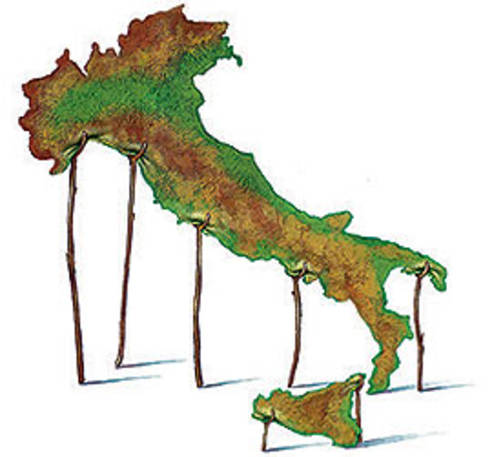Italy has very often been portrayed in the international mass media as “the sick man of Europe” (we all remember the famous
Economist [2] cover), and it is now part of a recurrent theme: the image of a country in a societal and economic crisis. However, what is lacking is is a diagnosis for such a 'sick patient' as Italy is referred to, because work from social scientists is crucial to identify potential methods of ameliorating the problems.

.jpg)

The book Italy Today, the Sick Man of Europe has this merit; it does not stoop to the common discourse of the Italian crisis, but deploys an array of analysis from experienced and emergent social scientists that into deep explanations of unraveling and unsolved issues. The combination of Italian and non Italian scholars also creates an interesting mix of perspectives and approaches, providing a wide scope that leaves the reader with a sort of giant fresco of Italy and the shadows of its society. In fact, we should say it represents a 'chiaroscuro' of the country.
The overview of critical issues affecting Italy and its socio-economic fabric is wide: from the new emerging mafias to the predicaments of the political system, from the ongoing presence of Fascism to the failed reconciliation of the years of terrorism, from the missed opportunity of the EU funding to the increasing regional economic gap, this work covers it all.
A natural question would be: Do they analyze Berlusconi? Not denying the importance of an analysis of Berlusconi and of 'Berlusconismo', Italy Today focuses on other considerations to avoid the strong, recurrent and easy temptation to place all of Italy’s faults on Berlusconi’s shoulders.
For the editors of Italy Today, Berlusconi’s figure, with all its contradictions and oligarchic tendencies, often diverts the attention from deeper and older issues affecting Italy, a country that has never been an outstanding example of directly tackling national problems. We welcome this stand of focusing on Italy rather than on Berlusconi.
To conclude, this volume generally represents an example of different methodological frameworks–often cross-disciplinary–applied to the study of social phenomena, organizations, political parties, governments, economic systems, cultures and sub-cultures, and collective memory which are among the key topics in many of the social sciences and the humanities. Therefore the specific rationale behind Italy Today is that the Italian decline can be understood only through a systematic analysis of some concrete problems. Italy Today tries to give some diagnoses to Italy the 'sick patient.' After all, a sick patient usually gets better when given the right diagnoses.
Italy Today: Politics, Economy, Society
November 20 2009, 6:oo pm
Casa Italiana Zerilli Marimò
24 West 12th Street, NYCA panel discussion with:
Claudio Gatti (
Il Sole 24 Ore [3])
Matthew Kaminski (
Wall Street Journal [4])
Raoul Minetti (
Michigan State University [5])
Giuseppe A. Veltri (
Institute for Prospective Technological Studies [6], Seville, Spain)
Introduced by:
Gianluca Galletto (i-italy,
iMille [7])
On the occasion of the publication of:
Italy Today. The Sick Man of Europe
(
Routledge [8], 2010)
Edited by Andrea Mammone, Giuseppe A. Veltri
Gianluca Galletto is a former finance executive, a contributor to I-Italy and iMille.
Claudio Gatti, journalist of Il Sole-24 Ore in New York, is a contributor of the New York Times.
Matthew Kaminski is a member of the Wall Street Journal's editorial board, and previously,from 2004-08, was the editorial page editor of the paper's European edition, based in Paris.
Raoul Minetti is Associate Professor of Economics at Michigan State University and contributor of the book “Italy Today, a sick man of Europe”
Giuseppe A. Veltri is Scientific Fellow at European Commission and Co-Editor (with A. Mammone) of “Italy Today, a sick man of Europe”.




.jpg)
